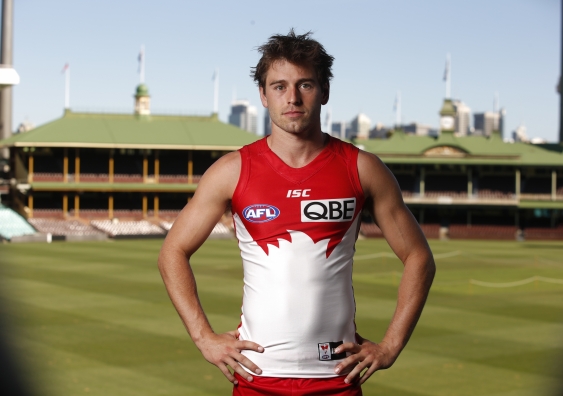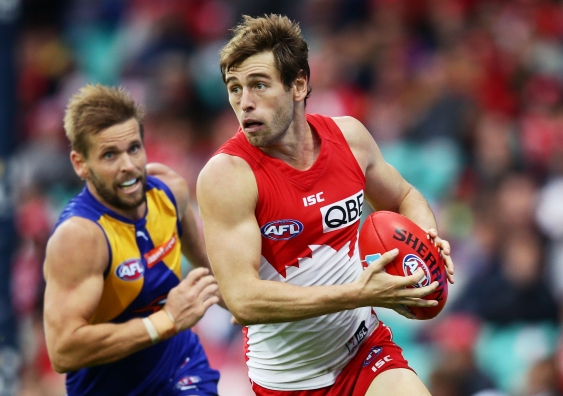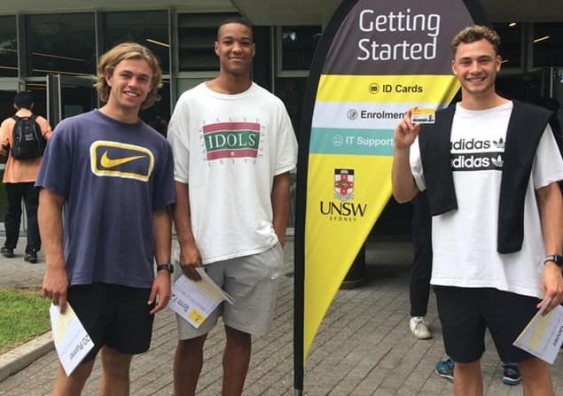Sydney Swans fly high at UNSW
A strong connection is building between the two Sydney institutions, with seven current and former Swans now studying at UNSW.
A strong connection is building between the two Sydney institutions, with seven current and former Swans now studying at UNSW.

Megan Maurice
UNSW News & Content
0414376510
megan.maurice1@unsw.edu.au
With the average professional sporting career lasting only three years and even the most successful players retiring by their mid-thirties, it’s no surprise that many athletes are turning to university study to prepare themselves for life after sport.
Over the past few years, a strengthening partnership between UNSW and the Sydney Swans has created a pipeline of players who are balancing their AFL career with study.
Increasing professionalism in the past 20 years has brought untold benefits to Australian sport. When athletes can make a living from their sport, it means more doors open for young people from lower socioeconomic backgrounds to follow their dreams and pursue a sporting career while also being able to support their families.
However, one major drawback of the professional era is the temptation for players to focus entirely on sport and neglect developing the career skills needed for their post-sporting lives.
The transition to life after sport can be a shock for those who haven’t adequately prepared.
After many years of embracing athletes devoting all their time and energy to sport, sporting bodies are now starting to understand the benefits of supporting their athletes through study and work and are actively encouraging players to become more well-rounded people.
In the NRL for example, players who are 20 years or younger need to complete a minimum of eight hours work or study a week to be eligible for team selection.
"It just adds a degree of responsibility," NRL wellbeing and education manager Paul Heptonstall told the Sydney Morning Herald in December.
"If you're sitting down at a university table where you don't care whether I am a footballer or not, but we have both got to get our assignment done ... it makes them appreciate more the idea of being a professional athlete.
"If you've only got one pillar in your life and it's only footy, and that's not going well, you'll fall over."
In the AFL, there have been discussions during the current hiatus around raising the draft age to 20 to ensure players experience work or study outside of sport before entering the professional competition.
For the Swans players at UNSW, the chance to get a head start on a post-football career was too good an opportunity to turn down.
The students vary widely in age, experience and career goals, but all agree that their study at UNSW is essential to finding balance in their lives and preparing for the future.
From young up-and-coming players such as Will Hayward, James Rowbottom and Joel Amartey, to the more experienced Dane Rampe and retired stars Nick Smith, Dean Towers and Brandon Jack, the seven current and former Swans are applying themselves to get the most out of their studies.

Nick Smith believes the flexibility of study options at UNSW allowed him to succeed on and off the field. Photo: AFL Photos
Smith, a 31-year-old who retired from the AFL in 2019 after 211 games, is back for a second stint at UNSW, working towards his MBA after completing a degree in economics during his playing days.
“Initially I enrolled into UNSW because of its proximity to where we train, play and live,” he said.
“I quickly realised that proximity was only one of many benefits of studying there. UNSW, and particularly the AGSM, provided flexibility so I could succeed in a professional sporting environment while also completing a degree.”
Smith believes UNSW’s Elite Athlete Program was critical in getting him through his undergraduate degree.
“Often the Elite Athlete Program provided a conduit between the student and the different faculties,” he said.
“It wasn't always easy combining the demands of AFL with study but having the relationship I did with the Elite Athlete Program certainly made things easier.”
For veteran Rampe, who at 29 has played 159 AFL games, the flexibility of the UNSW program has allowed him to flourish in his Commerce studies.
“I transferred to UNSW when the uni adopted trimesters,” he said.
“It suits our program and our season structure much better.”

Will Hayward, Joel Amartey and James Rowbottom recently commenced their studies at UNSW to prepare for life after sport.
For two of the new students to UNSW, 19-year-old Rowbottom and 21-year-old Hayward, their time in a professional sporting environment has taught them important skills they have been able to bring to their studies.
“Being an athlete has taught me that I’m able to bring full commitment to my studies if I put my mind to it,” Rowbottom said.
Hayward agreed, adding that being in a high-pressure environment has helped him learn from teammates and coaches.
“Communication and leadership are two areas I’ve been able to bring over really successfully into my studies."
With far less certainty in their lives than ever before, the structure and opportunities offered by tertiary study have been integral to the lives of these professional athletes.
Smith’s decision to return to study highlights the challenges thrown up by the current crisis.
“Since finishing my playing career last year I have been working in hospitality,” he said.
“Unfortunately with the arrival of Covid-19 our work has dried up. For that reason, I'm looking to acquire more skills and hence undertaking an MBA.
“It's a shocking time for everyone but I want to be as ready as I can be when things get back to 'normal'.”